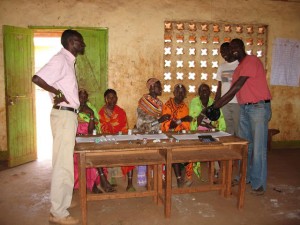Innovative Solutions for Poverty Reduction
Leading scientists and development practitioners shared evidence and provided recommendations on strengthening rural communities’ economic resilience through social protection programs during the BASIS/AMA CRSP’s event “Building Resilience and Assets for Food Security: Evidence and Implications for Feed the Future (FTF).” Meeting in Washington, D.C., researchers addressed critical topics including when groups can graduate from social protection programs, the operation of cash transfers and asset building, how savings can be a means to reduce poverty, and how to include vulnerable populations into value chains. The research on which the discussion drew had been conducted in FTF countries including Bangladesh, Ethiopia, Kenya, Malawi, Mozambique, Nicaragua, Senegal, and in the Mexico/Central America Region. The work aligned with many of FTF’s focus areas including inclusive agriculture sector growth, research and capacity building, gender integration, and environment-sensitive development.
Setting the tone for the conference Lena Heron, USAID’s project officer for the BASIS/AMA CRSP, opened with comments on sustainably reducing global poverty and hunger and the importance of inclusive agriculture-led growth within the context of USAID’s FTF Results Framework.
 Christopher Barrett of Cornell University presented innovative research on market mediated index-based insurance products designed to mitigate the adverse effects of asset loss experienced by smallholder farmers and livestock keepers effected by climate-related risks. Index-based insurance increases smallholders’ resilience, productivity, and economic well-being. The Kenya Index-Based Livestock Insurance (IBLI) project is one of the Index-Insurance Innovation Initiative (I4)’s activities and was developed in collaboration with the BASIS CRSP and other partners including USAID, the Food and Agriculture Organization of the United Nations, the Micro-Insurance Innovation Facility of the International Labour Organization, and Oxfam America.
Christopher Barrett of Cornell University presented innovative research on market mediated index-based insurance products designed to mitigate the adverse effects of asset loss experienced by smallholder farmers and livestock keepers effected by climate-related risks. Index-based insurance increases smallholders’ resilience, productivity, and economic well-being. The Kenya Index-Based Livestock Insurance (IBLI) project is one of the Index-Insurance Innovation Initiative (I4)’s activities and was developed in collaboration with the BASIS CRSP and other partners including USAID, the Food and Agriculture Organization of the United Nations, the Micro-Insurance Innovation Facility of the International Labour Organization, and Oxfam America.
Many of the presentations focused on the ways cash transfers move people out of poverty. Michael Carter, the BASIS CRSP director, expanded on this theme by addressing a less commonly investigated topic: the effects of land and asset transfer on improving the lives of the poor. Carter’s research, done in collaboration with Malcom Keswell from Stellenbosch University, assessed the impacts land and asset transfer from the wealthy to the less-wealthy had in South Africa as it was undergoing market-assisted land reform. Through this study Carter and Keswell estimated that land transfers increased household per-capita living standards by 25 percent.
This event took place in Washington, D.C. on September 29-30, 2011. All presentations from the event can be accessed here.
